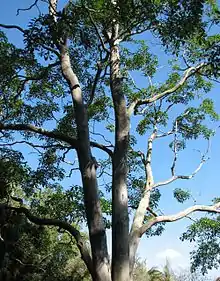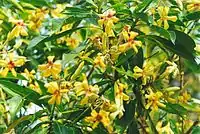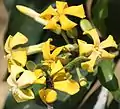Hymenosporum
Hymenosporum flavum, or native frangipani, is a rainforest tree which is native to Queensland and New South Wales in Australia and New Guinea. It is the sole species within the genus Hymenosporum, and is closely related to the widespread genus Pittosporum.
| Hymenosporum | |
|---|---|
 | |
| Scientific classification | |
| Kingdom: | Plantae |
| Clade: | Tracheophytes |
| Clade: | Angiosperms |
| Clade: | Eudicots |
| Clade: | Asterids |
| Order: | Apiales |
| Family: | Pittosporaceae |
| Genus: | Hymenosporum R.Br. ex F.Muell. |
| Species: | H. flavum |
| Binomial name | |
| Hymenosporum flavum | |
Despite its common name, it is not closely related to the frangipani. The species epithet flavum is Latin for yellow and indicates its flower colour.[1][2]
Description

It produces clusters of fragrant flowers in spring (September to October)[3] which are about 5 cm in diameter. They are cream in colour, ageing to yellow and are followed by long pear-shaped seed capsules. The flowers attract bees and honey-eating birds and butterflies. It has dark green, glossy leaves which are usually around 10 cm long and 4 cm wide. At its best, the branches are heavily foliaged and form widely spaced tiers which makes the tree extremely attractive.
Cultivation
Native frangipani is widely cultivated and usually grows to around 8 metres in height although it can grow to over 20 metres tall in the rainforest. It can be grown in shaded positions, but flowers best in full sun.
In Australia, the tree is commonly planted in suburban streets, in shopping boulevards and in walkways between tall buildings. It prefers a well-drained soil with a high organic content, but is highly adaptable. Very young seedlings are easily killed by frosts but if kept in a sheltered position until about 1–1.5 metres high, will thrive in cooler areas, as long as they have access to water during hot dry spells.
Hymenosporum flavum is included in the Tasmanian Fire Service's list of low flammability plants, indicating that it is suitable for growing within a building protection zone.[4]
Gallery
 Hymenosporum flavum
Hymenosporum flavum.JPG.webp) Leaves and flowers
Leaves and flowers Flowers close up
Flowers close up Seed capsules
Seed capsules.jpg.webp) Mature tree flowering
Mature tree flowering
References
- Harrison, Lorraine (2012). RHS Latin for gardeners. United Kingdom: Mitchell Beazley. p. 224. ISBN 9781845337315.
- Sia Morhardt and Emil Morhardt California Desert Flowers: An Introduction to Families, Genera, and Species, p. 101, at Google Books
- Morcombe, Michael (1991). Australia's Wildflowers (Réimpr. ed.). Sydney: The Book Company and Ure Smith Press. p. 29. ISBN 0725408731.
- Chladil and Sheridan, Mark and Jennifer. "Fire retardant garden plants for the urban fringe and rural areas" (PDF). www.fire.tas.gov.au. Tasmanian Fire Research Fund.
